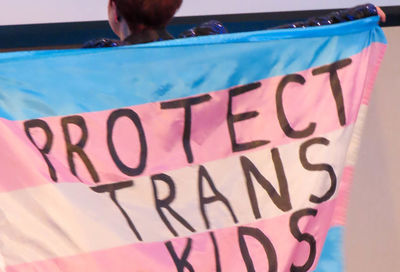Merry Mourning
''Elegies: A Song Cycle'' at Signature Theatre
William Finn has known some pretty eclectic characters in his lifetime, and the prominent composer/lyricist writes about their lives — not the circumstances of their deaths — in his latest contribution to American musical theater, Elegies: A Song Cycle. Although producing a springtime show centered around the deceased may seem a strange artistic decision, there are no dense, dreary death marches or songs of keening here. Instead, Finn’s collection of up-tempo melodies and soaring ballads is a buoyant celebration of the lives of friends and family members who have passed on.
While some of Finn’s musical stories are glaringly truthful and some universally relevant, others seem imaginary and contrived. Nevertheless, all are characters in Finn’s life who have made an impact on him in some capacity. As Finn creates a seamless soundscape of memories and emotions, he is not making music from their death, but illuminating the pieces and parts he wants to commemorate from their past.
 |
Originally produced at the Lincoln Center Theatre last spring, Elegies was warmly received by audiences who were treated to a stellar cast including the incomparable Betty Buckley, Carolee Carmello and Michael Rupert. With such talented singers and its spirited, inspired score, it’s easy to see why Signature would opt to mount Finn’s work for the first time on their stage. But despite its benevolent message and classic themes of honoring our loved ones, Finn’s musical fails to connect with audiences outside of the New York theater community about which he writes.
The more learned theater audiences are of course familiar with Joe Papp and Ricky Ian Gordon, but if you don’t know who Bolek Greczynski or Jack Eric Williams were, then the tributes on their behalf may sound foreign and irrelevant. While it’s arguable that Finn’s stories are amusing and entertaining, much of the evening is spent recounting events so personal and private they don’t really resonate in the ears of a stranger.
Despite Finn’s lack of storytelling device or dramatic arc to tie the pieces together, his music still retains the ability to invoke images that should be arresting and engaging. Under Joe Calarco’s direction, however, this production seems tepid and strongly sanitized. Calarco’s cautious, controlled staging is bland and unoriginal, with characters frequently tapping or gently kicking inflated balloons across the stage. And without an intermission to allow the audience to decompress (which decidedly should be after the intensely moving “Anytime “), the evening tumbles into an endless stream of mind-numbing tunes.
Calarco also makes the unfortunate mistake of playing directly into tired gay stereotypes. It would be nice to see gay men who aren’t portrayed as sappy, sentimental yuppies (“Mark’s All-Male Thanksgiving “) or lesbians who are vulnerable and human (“Peggy Hewitt & Misty del Giorno “). But Calarco doesn’t bother to go against the grain here, offering safe, conservative portraits that diminish Finn’s titillating lyrics.
Enter musical director Jon Kalbfleisch, the true impresario of Elegies, who gleans a host of refined harmonies and multi-dimensional sounds from a talented cast of singers, including Donna Migliaccio, Michael Sharp, Sherri L. Edelen, Will Gartshore and Larry D. Hylton. His quintet offers powerful solos as well as gut-wrenching duets, particularly between Hylton and Edelen in “Saying My Goodbyes/Boom Boom. ” Edelen is the most consistently captivating figure, with impossibly energetic performances and a very visible emotional range. Just buying a ticket to listen to her strong, sustained belting is admission to a master class in vocal dynamics.
Migliaccio has never sounded better in her life-affirming “Infinite Joy ” and sparkles during her comic turns in “Only One, ” while Gartshore is darling as he recollects the memories of “My Dog. ” In what is easily one of Finn’s best ballads, Gartshore is also quietly heartbreaking in Finn’s delicate tribute to his mother, “When the Earth Stopped Turning. ”
|
 Although Signature’s dark, cavernous space may seem a perfect venue for such an ode to funereal fineries, against Calarco’s cheerful visions and Finn’s optimistic lyrics, it’s a vivid contrast that doesn’t quite match up. Chris Lee’s unusual lighting design helps break up some of the grim ambience, which adds a much-needed element of drama in a few unexpected places.
In an evening that highlights matters of life and death, Elegies harnesses the potential to be deeply cathartic, emotionally satisfying, and at the very least, stirring. There are a few tender moments in Calarco’s lukewarm presentation, but don’t expect any tearjerkers or moments of revelation. Ironically, the only lamentations and grievous undertones are conjured by the fact that his production does little to stir any feelings of sadness or joy.
Support Metro Weekly’s Journalism
These are challenging times for news organizations. And yet it’s crucial we stay active and provide vital resources and information to both our local readers and the world. So won’t you please take a moment and consider supporting Metro Weekly with a membership? For as little as $5 a month, you can help ensure Metro Weekly magazine and MetroWeekly.com remain free, viable resources as we provide the best, most diverse, culturally-resonant LGBTQ coverage in both the D.C. region and around the world. Memberships come with exclusive perks and discounts, your own personal digital delivery of each week’s magazine (and an archive), access to our Member's Lounge when it launches this fall, and exclusive members-only items like Metro Weekly Membership Mugs and Tote Bags! Check out all our membership levels here and please join us today!


















